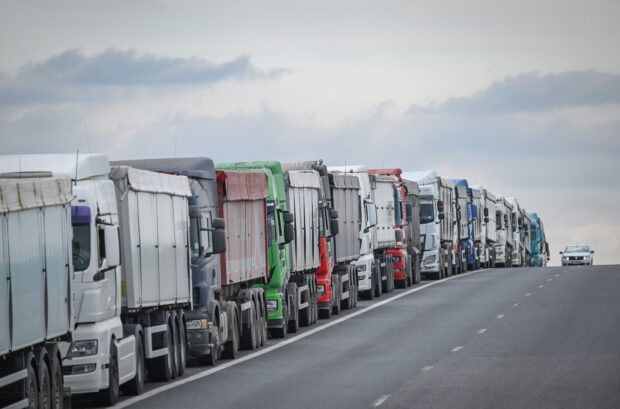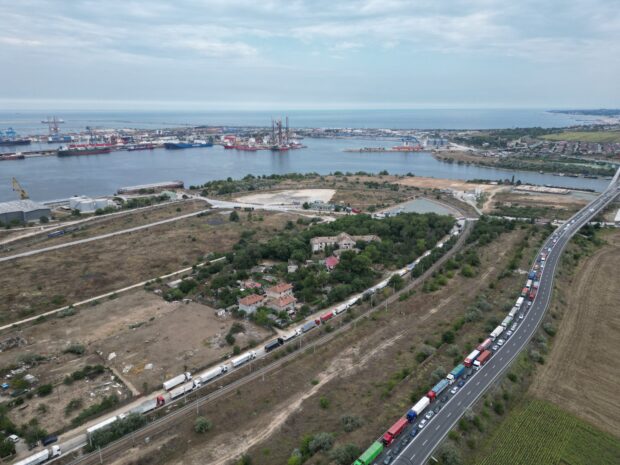
Partial view of a 4 kilometers queue of grain transporting vehicles ready to enter the grain terminals in Constanta harbor, Romania on July 31, 2023. For the reason that starting of the warfare in neighbouring Ukraine, Constanta, the most important port for cereals in Europe, has been on a race to adapt to the rising inflow of Ukrainian grain. (Picture by Daniel MIHAILESCU / AFP)
IZMAIL, Ukraine -Anton Moiseyev sat for the third day within the cabin of his lorry, parked by a roadside cafe in Ukraine’s southern Odesa area, in a bottleneck triggered by Russia’s scrapping of a grain delivery deal.
He was ready together with tons of of different lorry drivers taking grain to the Danube river port of Izmail, now the principle export route for Ukrainian agricultural merchandise.
“I don’t understand how for much longer it’s going to take,” mentioned the 41-year-old driver delivering a cargo of wheat from the central Kirovograd area.
Beforehand, Ukraine exported through the Black Sea on massive ships however a wartime deal on secure passage broke down after Moscow exited July 17.
Russia then bombed Black Sea port infrastructure.
Big volumes of grain are actually heading to small river ports in Odesa area adjoining to Romania.
“That’s why everybody comes right here. From throughout Ukraine, virtually,” mentioned lorry driver Sergiy Gretsyk, 36, from Vinnytsia area in centre-west Ukraine.
Previously obscure ports, Reni and Izmail, have change into essential to world meals provides and are struggling to course of all of the grain, inflicting the huge bottleneck.
“The ports of Reni and Izmail can not deal with this,” since they’re “drops within the ocean” in comparison with the Black Sea ports, Moiseyev mentioned.
“There may be numerous grain however we are able to’t get it out.”

Aerial pictures of a 4 kilometers queue of grain transporting vehicles ready to enter the grain terminals in Constanta harbor July 31, 2023. (Picture by Ionut IORDACHESCU / AFP)
‘One strike and all of it ended’
In an additional impediment, Russia attacked Reni with drones on July 24.
It was unclear whether or not Reni port was nonetheless working.
Military spokeswoman Nataliya Gumenyuk advised AFP on Wednesday that “the injury is sort of vital, nevertheless it didn’t cease the port utterly”.
All of the lorry drivers AFP reporters spoke to had been heading to Izmail.
“The blokes (at Reni) say that they gained’t settle for us there but,” mentioned Gretsyk.
“Issues bought worse after Reni was bombed,” Moiseyev mentioned, explaining the ports had improved processing time since final yr.
“One strike and all of it ended, we’re sitting and ready once more.”
In Izmail itself, at the least 4 cargo ships had been docked at or close to the port, going through Romania throughout the broad, greenish river, AFP journalists noticed.
Ships on the river had been flying flags together with Liberia and Slovakia.
Lorries had been ready exterior the port however the cranes weren’t working.
Lorry drivers blamed the wet climate, saying Izmail doesn’t have services to load grain beneath cowl.
Grain growth
On the street to the port, birds pecked at grains of wheat and maize spilled from lorries.
The small city — with a pre-war inhabitants of about 70,000 — gave the impression to be benefitting from the grain growth.
On the principle avenue, there have been Ukrainian flags flying and the tarmac and pavements seemed new and effectively maintained. There have been quite a few eating places and cafes and a yacht membership beneath building.
Because of its strategic place, Izmail has modified arms many instances.
A stone mosque on the riverbank dates again to sixteenth century Turkish rule.
The street from Odesa to Izmail is a single carriageway, passing fields of maize and sunflowers and vineyards. It crosses into Moldova briefly.
Lengthy traces of lorries had been parked on roadsides and in tarmacked areas in fields, ready for his or her flip to unload in a queueing system.
Many had been unmarked however some had names of haulage corporations from Poland, France, Germany and the Czech Republic however Ukrainian plates.
One driver, Igor Skrypnyk, 47, mentioned he had been ready eight days.
“Our ship hasn’t but bought into the port. It’s not clear why,” Skrypnyk mentioned, suggesting the ships can also be ready in line.
“Lorry drivers are quitting, they don’t need to work,” he mentioned.
Learn Subsequent
Subscribe to INQUIRER PLUS to get entry to The Philippine Every day Inquirer & different 70+ titles, share as much as 5 devices, hearken to the information, obtain as early as 4am & share articles on social media. Name 896 6000.



